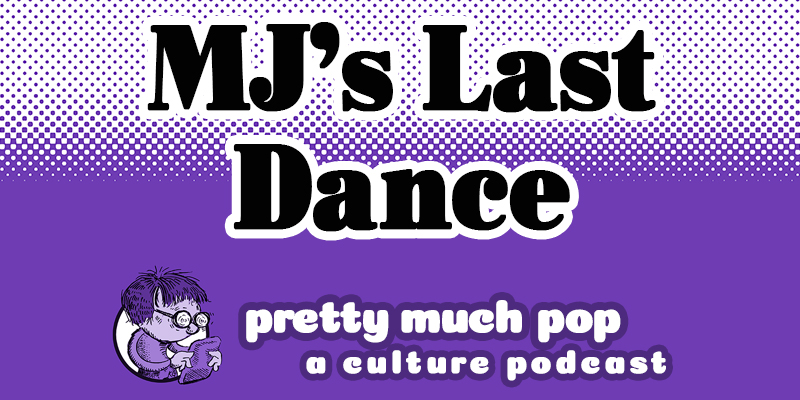Michael Jordan’s “The Last Dance” and Hero Worship: A Pretty Much Pop Culture Podcast Discussion (#50)

The 10-part ESPN documentary dissecting Michael Jordan and the Bulls' six championships has provided some much needed sports during the pandemic, roping in even sports haters with a mix of game highlights and behind-the-scenes drama.
Your hosts Brian Hirt, Erica Spyres, and Mark Linsenmayer are joined by Seth from The Partially Examined Life to interrogate the event: Was it actually worth 10 hours of our time? Did its "time-jumping" structure work? Its its treatment of Jordan really "hagiography" sanctifying the man, or is the picture of grudge-holding ultra-competitiveness actually pretty repulsive? Why was he like that? Why are sports amenable to creating cultural icons out of its heroes in a way that, say, physics isn't? Are we going to see many more of these long-form treatments of sports heroes?
For more discussion, here are some articles we looked at:
- "I'm Not American and Not a Basketball Fan, but I Watched Michael Jordan's 'The Last Dance' — And It Was by Far the Best Sports Documentary I've Ever Seen" by Barnaby Lane
- "‘The Last Dance’ Left a Little Room for Nitpicking" by Matt Lagone
- "Michael Jordan's Yellow Eyes Are Never Explained by 'The Last Dance,' Concerning Fans" by RIck Thomas
- "Why Michael Jordan Didn’t Allow Film Crews into His Real Mansion for ‘The Last Dance’" by Luke Norris
- "Did Utah Pizza Give Michael Jordan Food Poisoning and Was It Intentional?" by Rob Schaefer
- "A Masterclass In Leadership: The Last Dance" by Don Yaeger
- "‘The Last Dance’ Director Defends Creative Choice To Flash Forward To 2046" from The Onion
If you enjoyed this, check out our episode #25 with sportscaster Dave Revsine.
Learn more at prettymuchpop.com. This episode includes bonus discussion that you can only hear by supporting the podcast at patreon.com/prettymuchpop. This podcast is part of the Partially Examined Life podcast network.
Pretty Much Pop: A Culture Podcast is the first podcast curated by Open Culture. Browse all Pretty Much Pop posts or start with the first episode.
Michael Jordan’s “The Last Dance” and Hero Worship: A Pretty Much Pop Culture Podcast Discussion (#50) is a post from: Open Culture. Follow us on Facebook, Twitter, and Google Plus, or get our Daily Email. And don't miss our big collections of Free Online Courses, Free Online Movies, Free eBooks, Free Audio Books, Free Foreign Language Lessons, and MOOCs.
from Open Culture https://ift.tt/2AnSX0r
via Ilumina
Comments
Post a Comment